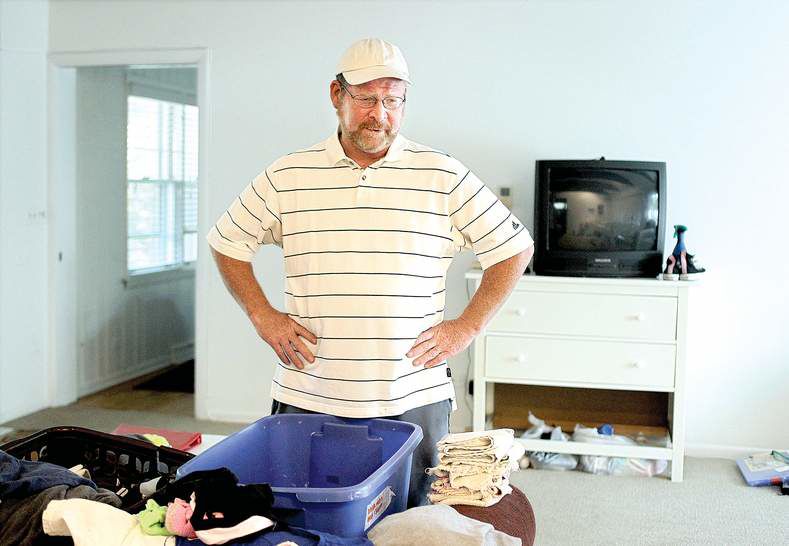From riches to rags
Published 5:00 am Wednesday, October 5, 2011

- Bob Baschoff, who has a degree in accounting from Villanova but has been without a steady job for three years, folds laundry in his daughters' room last month. “Nothing in life prepares you to go through what we've been through,” said Baschoff, who lives in Lake Bluff, Ill., with his wife and four children.
CHICAGO — Bob Baschoff used to work for a bank, commanding a corner office and a six-figure salary that allowed his family to enjoy a comfortable life in the wealthy lakefront village of Lake Bluff, Ill.
All of that is gone now. Baschoff was laid off during the financial crisis of 2008 and hasn’t found steady work since. The family lost one home to foreclosure and was evicted from two rentals. Though they’re still in Lake Bluff — a relative is paying the rent — they must rely heavily on charity and the government for food, health care and other necessities.
“When I’m around the parents of my kids’ friends or teammates, every guy I look at, it’s like, ‘I wonder what he does? What does he make? Why can’t I do it?’” said Baschoff, 56, a barrel-chested, bespectacled man whose sandpaper voice betrays his South Jersey roots. “I feel so out of place. I feel like a misfit.”
Though the recession has been hardest on low-income Americans, it is also present in some of the most affluent ZIP codes. Tales abound of formerly well-off families that have been tossed into an economic tailspin.
Adjusting to hardship after decades of security can be a humiliating education. Ben Horbacz, of Naperville, Ill., a former customer support professional who has been out of work for two years, recently became a client at Loaves and Fishes, the food pantry where he volunteers. When he made his first pickup, he was embarrassed to run into people he knew.
But pride, he said, quickly yielded to necessity.
“I think we’ve passed that hurdle,” said Horbacz, 63. “I’ve gotten to the point where it doesn’t really bother me.”
It still bothers the Baschoffs, even though they’ve been lucky in some ways. Their fall has been cushioned by family, friends and social service agencies, and their four children continue to attend public schools that are among the best in the state.
Being broke, though, offers a steady diet of stress and indignity, no matter a person’s address. The Baschoffs’ marriage has frayed under the strain, and their children are nursing their own tender but well-hidden scars.
“I don’t really think about it,” said one of Baschoff’s daughters, a 15-year-old sophomore. “When I think about it, I cry.”
Life was good when Baschoff and his family moved from a New Jersey suburb of Philadelphia to Illinois in December 2007. His employer, a Lake Forest bank, wanted him to join the home office, and to sweeten the deal it agreed to temporarily pay the rent on a Lake Bluff house, Baschoff said.
The family wasn’t crazy about leaving their friends and relatives, but it seemed like a good move. Though Baschoff, a senior vice president, made enough money to treat his kids to computers, bikes and long vacations without a thought, finances were tight. They were paying $40,000 a year for private school tuition and had just sunk $25,000 more into a home renovation.
Moving, they decided, would let them save on tuition while still ensuring that their children received a top-notch education. And with the New Jersey real estate market beginning to soften, they could avoid taking a loss on their home by renting it out.
“We had a plan,” said Lisa Baschoff, a stay-at-home mother who was recovering from breast cancer at the time. “The future looked bright.”
But eight months after Baschoff arrived, the bank eliminated his position. He thought he would quickly find another job, but with the financial crisis reaching full boil, banks were shedding people, not hiring them.
Not even their New Jersey house, once estimated to be worth close to $300,000, could save them. Their tenants lost their jobs and stopped paying rent, and the Baschoffs couldn’t make the mortgage. The house went into foreclosure and was sold last year for $186,000, according to public records.
With little cash in the bank, they quickly realized they couldn’t make it on their own. In October 2008, less than two months after Baschoff lost his job, his wife walked into an Illinois Department of Human Services office to apply for food assistance and Medicaid.
It was, she recalled, a humbling experience. She felt that everyone, clients and clerks alike, was looking at her with suspicion, as if she were cheating the system. She turned her face into a dignified mask, showing no emotion until she reached the parking lot. Then she broke down in sobs.
Such reckonings have become a regular occurrence among people in affluent areas, according to some who work in social services. West Deerfield Township Supervisor Julie Morrison, whose territory includes parts of Lake Forest, Highland Park and Deerfield, said clients who come from privileged areas are much less savvy about the system than those accustomed to longer-term hardship.
“They have no idea how to file for unemployment benefits unless someone walks them through,” she said. “They don’t know all the benefits that are available to them.”
For the moment, Baschoff is trying to keep a foothold, however wobbly, on the economic ladder. His steadiest gig is at First Presbyterian Church of Lake Forest, where he makes $11 an hour doing part-time janitorial work and general labor.
“Someday I’m going to frame my Link card and unemployment card and put them on the wall of my office,” he said. “I want to see them every day, so I can promise myself it’ll never happen again.”






